Sources said Japanese automakers Honda and Nissan are discussing a plan that would see Honda sell vehicles produced by Nissan in the United States. Under the plan, pickup trucks made at an under-utilized Nissan plant in the US would be sold under the Honda brand.

Sources said Japanese automakers Honda and Nissan are discussing a plan that would see Honda sell vehicles produced by Nissan in the United States. Under the plan, pickup trucks made at an under-utilized Nissan plant in the US would be sold under the Honda brand.
Honda likely aims to expand its customer base through the deal. It would also help Nissan, whose US plants have been operating below capacity due to sluggish sales. Additional US import tariffs on autos and auto parts have heightened the pressure on Nissan to make better use of its American production base. Honda and Nissan's discussions come despite a failed attempt to merge earlier this year.
mitv
Sources said Japanese automakers Honda and Nissan are discussing a plan that would see Honda sell vehicles produced by Nissan in the United States. Under the plan, pickup trucks made at an under-utilized Nissan plant in the US would be sold under the Honda brand.
Honda likely aims to expand its customer base through the deal. It would also help Nissan, whose US plants have been operating below capacity due to sluggish sales. Additional US import tariffs on autos and auto parts have heightened the pressure on Nissan to make better use of its American production base. Honda and Nissan's discussions come despite a failed attempt to merge earlier this year.
mitv
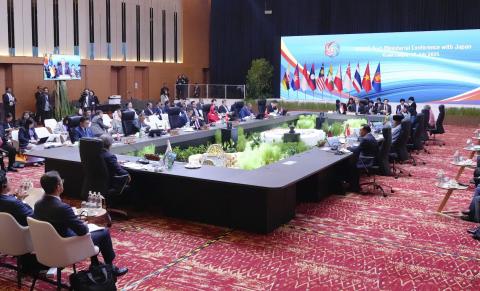
KUALA LUMPUR - Japanese Foreign Minister Takeshi Iwaya called for a "free, fair and open" international economic order in his talks Thursday with his ASEAN counterparts in Malaysia, amid trade tensions stemming from the threat of steep U.S. tariffs against Japan and the group's members.
KUALA LUMPUR - Japanese Foreign Minister Takeshi Iwaya called for a "free, fair and open" international economic order in his talks Thursday with his ASEAN counterparts in Malaysia, amid trade tensions stemming from the threat of steep U.S. tariffs against Japan and the group's members.
Noting the 10-member Association of Southeast Asian Nations is "at the center of global growth," Iwaya said Japan is eager to strengthen cooperation with the regional bloc, adding its role has been "increasingly important for regional peace and prosperity."
With the tariffs proposed by U.S. President Donald Trump in mind, the Japanese minister stressed the need to "maintain and strengthen" the multilateral trading system with the World Trade Organization at its core.
Trump has said the United States will impose a 25 percent tariff on imports from Japan starting Aug. 1, while goods from six ASEAN members will face up to 40 percent duties.
At the talks, ASEAN ministers pointed to the importance of ensuring freedom of navigation in the South China Sea and resolving disputes in the waters based on the U.N. Convention on the Law of the Sea, the Japanese Foreign Ministry said, amid tensions between China and some ASEAN members over territorial rows.
The Japanese minister also unveiled Tokyo's plan to boost people-to-people exchanges with ASEAN nations, including the dispatch of some 600 "Japanese language partners" to the region by the end of March next year.
Iwaya separately met with his counterparts from the Mekong countries -- Cambodia, Laos, Myanmar, Thailand and Vietnam -- and vowed to boost Japan's cooperation with them in such areas as disaster prevention, decarbonization and digitalization, as well as efforts to tackle cross-border crimes including online fraud.
The other ASEAN members are Brunei, Indonesia, Malaysia, the Philippines and Singapore.
In a joint statement, Japan and the five Mekong countries underscored the need to address transboundary issues such as cybercrimes, online scams and money laundering. Japanese nationals are among those involved in online fraud operations run by criminal organizations that have bases in Southeast Asian countries such as Myanmar and Cambodia.
Japan and the Mekong nations also recognized the importance of holding a new round of summit meetings involving their leaders. They last held a leaders' gathering in a video conference format in 2020.
Ref : Kyodo News
KUALA LUMPUR - Japanese Foreign Minister Takeshi Iwaya called for a "free, fair and open" international economic order in his talks Thursday with his ASEAN counterparts in Malaysia, amid trade tensions stemming from the threat of steep U.S. tariffs against Japan and the group's members.
Noting the 10-member Association of Southeast Asian Nations is "at the center of global growth," Iwaya said Japan is eager to strengthen cooperation with the regional bloc, adding its role has been "increasingly important for regional peace and prosperity."
With the tariffs proposed by U.S. President Donald Trump in mind, the Japanese minister stressed the need to "maintain and strengthen" the multilateral trading system with the World Trade Organization at its core.
Trump has said the United States will impose a 25 percent tariff on imports from Japan starting Aug. 1, while goods from six ASEAN members will face up to 40 percent duties.
At the talks, ASEAN ministers pointed to the importance of ensuring freedom of navigation in the South China Sea and resolving disputes in the waters based on the U.N. Convention on the Law of the Sea, the Japanese Foreign Ministry said, amid tensions between China and some ASEAN members over territorial rows.
The Japanese minister also unveiled Tokyo's plan to boost people-to-people exchanges with ASEAN nations, including the dispatch of some 600 "Japanese language partners" to the region by the end of March next year.
Iwaya separately met with his counterparts from the Mekong countries -- Cambodia, Laos, Myanmar, Thailand and Vietnam -- and vowed to boost Japan's cooperation with them in such areas as disaster prevention, decarbonization and digitalization, as well as efforts to tackle cross-border crimes including online fraud.
The other ASEAN members are Brunei, Indonesia, Malaysia, the Philippines and Singapore.
In a joint statement, Japan and the five Mekong countries underscored the need to address transboundary issues such as cybercrimes, online scams and money laundering. Japanese nationals are among those involved in online fraud operations run by criminal organizations that have bases in Southeast Asian countries such as Myanmar and Cambodia.
Japan and the Mekong nations also recognized the importance of holding a new round of summit meetings involving their leaders. They last held a leaders' gathering in a video conference format in 2020.
Ref : Kyodo News
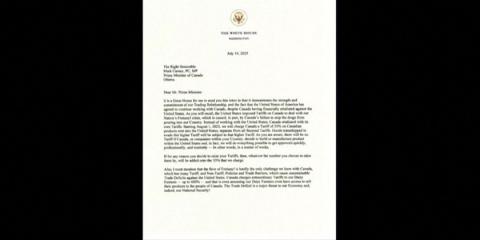
Canada will face a 35 percent tariff on exports to the United States starting August 1, President Donald Trump said Thursday in a letter to Prime Minister Mark Carney. Canada and Mexico are both trying to find ways to satisfy Trump so that the free trade deal uniting the three countries - known as the USMCA - can be put back on track.
Canada will face a 35 percent tariff on exports to the United States starting August 1, President Donald Trump said Thursday in a letter to Prime Minister Mark Carney. Canada and Mexico are both trying to find ways to satisfy Trump so that the free trade deal uniting the three countries - known as the USMCA - can be put back on track.
The United States-Mexico-Canada Agreement replaced the previous NAFTA accord in July 2020, after Trump successfully pushed for a renegotiation during his first term in office. It was due to be reviewed by July next year.
mitv
Canada will face a 35 percent tariff on exports to the United States starting August 1, President Donald Trump said Thursday in a letter to Prime Minister Mark Carney. Canada and Mexico are both trying to find ways to satisfy Trump so that the free trade deal uniting the three countries - known as the USMCA - can be put back on track.
The United States-Mexico-Canada Agreement replaced the previous NAFTA accord in July 2020, after Trump successfully pushed for a renegotiation during his first term in office. It was due to be reviewed by July next year.
mitv
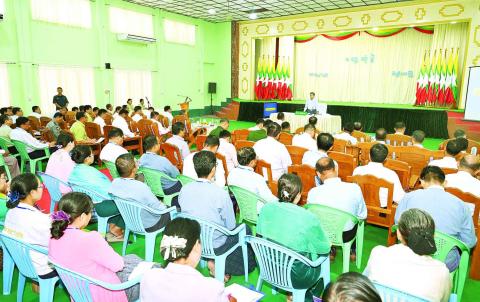
To help green the Meiktila area and reduce heat, green zones should be established in every region, ward, and village by planting at least two acres of trees in each, as tree-planting is essential for improving the weather and creating a cooler environment.
To help green the Meiktila area and reduce heat, green zones should be established in every region, ward, and village by planting at least two acres of trees in each, as tree-planting is essential for improving the weather and creating a cooler environment.
To help green the Meiktila area and reduce heat, green zones should be established in every region, ward, and village by planting at least two acres of trees in each, as tree-planting is essential for improving the weather and creating a cooler environment.

Electric vehicles have been imported into Myanmar with the approval of the Steering Committee on National-Level Development for Electric Vehicles and Related Industries.
Among them are China-made BYD Seal electric vehicles, imported by Earth Renewable Co Ltd, which arrived at Yangon Port and have been officially cleared per the relevant rules and regulations. — MNA/MKKS
GNLM
Electric vehicles have been imported into Myanmar with the approval of the Steering Committee on National-Level Development for Electric Vehicles and Related Industries.
Among them are China-made BYD Seal electric vehicles, imported by Earth Renewable Co Ltd, which arrived at Yangon Port and have been officially cleared per the relevant rules and regulations. — MNA/MKKS
GNLM
Electric vehicles have been imported into Myanmar with the approval of the Steering Committee on National-Level Development for Electric Vehicles and Related Industries.
Among them are China-made BYD Seal electric vehicles, imported by Earth Renewable Co Ltd, which arrived at Yangon Port and have been officially cleared per the relevant rules and regulations. — MNA/MKKS
GNLM
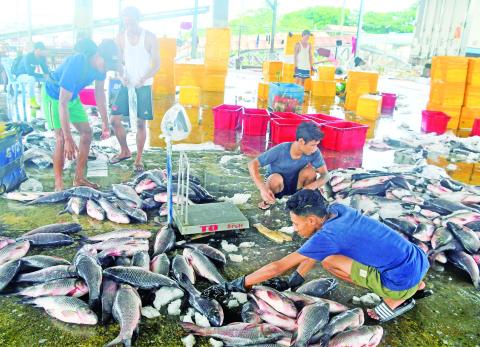
Myanmar Fisheries Federation stated that about 500,000 tonnes of freshwater and saltwater fish and seafood steadily flow into the Yangon market daily starting from July.
The fish spawning season ended, so the Myanmar sea is open to fishing. With commercial fishing resuming, fifty per cent of seafood is distributed to domestic markets and the remaining is stored in cold storage facilities designated for exports.
Myanmar Fisheries Federation stated that about 500,000 tonnes of freshwater and saltwater fish and seafood steadily flow into the Yangon market daily starting from July.
The fish spawning season ended, so the Myanmar sea is open to fishing. With commercial fishing resuming, fifty per cent of seafood is distributed to domestic markets and the remaining is stored in cold storage facilities designated for exports.
Kyimyindine’s Sanpya Fish Market and Shwepadauk Fish Market in Hlaing Township are the seafood hub that handles a daily supply of about 500,000 tonnes of seafood, with which freshwater to saltwater fish ratio is 3:1.
“Seafood businesses are thriving this year. Seafood supply meets the satisfaction of both consumers and sellers. Fish stored in cold storage were sold in the market in the previous fishing off-season,” said a trader involved in Sanpya Fish Market.
Year-round fishing might lead to damage to aquaculture resources. Consequently, the department concerned put a three-month halt to the offshore fishing season in the Myanmar Sea from May to July. This year, authorities shut down fishing operations for only two months. Over 20 types of saltwater fish, including Hilsa, Tongue Sole, Pomfret, tiger prawn, squid, eel and grouper, were stored in cold storage facilities through Yangon Port for continuous supply during the fishing ban season, catering to local demand and maintaining year-round seafood availability with the new fishing policy.
Myanmar’s offshore fishing is carried out in the sea territories of Ayeyawady, Rakhine and Taninthayi, and then, seafood and saltwater fish are supplied to Yangon’s major fish distribution hub. — ASH/KK
GNLM
Myanmar Fisheries Federation stated that about 500,000 tonnes of freshwater and saltwater fish and seafood steadily flow into the Yangon market daily starting from July.
The fish spawning season ended, so the Myanmar sea is open to fishing. With commercial fishing resuming, fifty per cent of seafood is distributed to domestic markets and the remaining is stored in cold storage facilities designated for exports.
Kyimyindine’s Sanpya Fish Market and Shwepadauk Fish Market in Hlaing Township are the seafood hub that handles a daily supply of about 500,000 tonnes of seafood, with which freshwater to saltwater fish ratio is 3:1.
“Seafood businesses are thriving this year. Seafood supply meets the satisfaction of both consumers and sellers. Fish stored in cold storage were sold in the market in the previous fishing off-season,” said a trader involved in Sanpya Fish Market.
Year-round fishing might lead to damage to aquaculture resources. Consequently, the department concerned put a three-month halt to the offshore fishing season in the Myanmar Sea from May to July. This year, authorities shut down fishing operations for only two months. Over 20 types of saltwater fish, including Hilsa, Tongue Sole, Pomfret, tiger prawn, squid, eel and grouper, were stored in cold storage facilities through Yangon Port for continuous supply during the fishing ban season, catering to local demand and maintaining year-round seafood availability with the new fishing policy.
Myanmar’s offshore fishing is carried out in the sea territories of Ayeyawady, Rakhine and Taninthayi, and then, seafood and saltwater fish are supplied to Yangon’s major fish distribution hub. — ASH/KK
GNLM
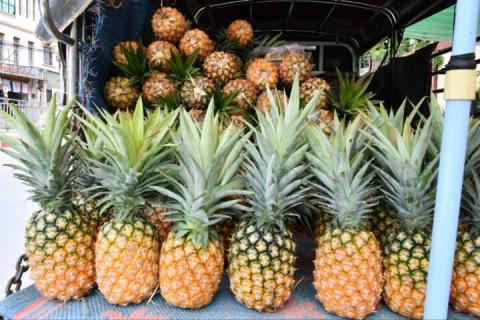
Pineapples produced from Shan State are mainly distributed to the domestic market, and they are aimed at heading for the Chinese market.
Pineapples are commonly grown in Shan and Mon states, especially in southern Shan State (Hsihseng, Namsang, Mongkaing), covering about 6,000 acres and northern Shan State (Hsipaw, Tangyan, Lashio), with about 7,000 acres. Myanmar’s pineapple production is estimated at 30,000-40,000 tonnes per year. The abundant harvest season is from July to September.
Pineapples produced from Shan State are mainly distributed to the domestic market, and they are aimed at heading for the Chinese market.
Pineapples are commonly grown in Shan and Mon states, especially in southern Shan State (Hsihseng, Namsang, Mongkaing), covering about 6,000 acres and northern Shan State (Hsipaw, Tangyan, Lashio), with about 7,000 acres. Myanmar’s pineapple production is estimated at 30,000-40,000 tonnes per year. The abundant harvest season is from July to September.
Pineapples of Hsipaw and Chinese Taipei origins are cultivated in the country. Cultivation cost is K4 million per acre. They can be harvested after one and a half years of cultivation, for the next five to seven years.
Traders even went down to the farm to buy the pineapples in early July, which is the beginning of the season. They are supplied to Mandalay and Yangon markets.
A company, a coordination mechanism for the growers from northern Shan State, is endeavouring to export pineapples to China through border trade channels. That company has already sought registration with the Customs of the People’s Republic of China (GACC) in 2024.
The Agriculture Department’s Plant Protection Division notified companies to submit an Expression of Interest (EOI) and seek registration with the Customs of the People’s Republic of China (GACC) by 28 February 2025 for legitimate pineapple exportation.
According to the Sanitary and Phytosanitary (SPS) Protocol between Myanmar and China, inspection procedures are undertaken yearly to verify compliance with the standards.
The General Administration of Customs of the People’s Republic of China (GACC) announced on 11 November that Myanmar’s pineapple will be allowed to be imported to China, following the Phytosanitary regulation.
Myanmar’s pineapple is cultivated in northern and southern Shan State. The harvest season is in June-September. Earlier, Myanmar’s pineapple export to China was conducted via a green channel under a cross-border trade plan. Yet, China halted this trade route on 16 June 2019, affecting Myanmar’s pineapple industry adversely.
Myanmar’s exporters explored new markets in Thailand, Singapore and other countries. However, the market share is quite low. A series of negotiations between Myanmar and China in the past years reaped a fruitful result, and Myanmar’s pineapple is now allowed to be exported to China via sea trade.
According to GACC’s notification, the Ministry of Agriculture, Livestock and Irrigation needs to forward the list of pineapple farms and processing factories to the Chinese side to seek approval from the GACC. The approved list will be disclosed on its website.
Myanmar’s growers are required to strictly adhere to good agricultural practices and implement quality management, a tracking system for food security and integrated pest management measures.
Packing fresh fruits includes washing fresh fruits with high-pressure spray and checking and removing debris to be free from insects, snails, invasive grass seeds, soil, crop residue, weeds and dirt.
Infestation of the spiralling whitefly (Aleurodicus dispersus), grey pineapple mealybug (Dysmicoccus neobrevipes), Passionvine mealybug (Planococcus minor), Jack Beardsley mealybug (Pseudococcus jackbeardsleyi) and the fungal plant pathogen Fusarium sacchari are considered devastating pests.
Therefore, Myanmar’s relevant authorities are asked to check samples of not less than two per cent of export volume within the first two years of pineapple trade. Inspection of food samples will be reduced to one per cent if pests cannot be detected in two years. — NN/KK
GNLM
Pineapples produced from Shan State are mainly distributed to the domestic market, and they are aimed at heading for the Chinese market.
Pineapples are commonly grown in Shan and Mon states, especially in southern Shan State (Hsihseng, Namsang, Mongkaing), covering about 6,000 acres and northern Shan State (Hsipaw, Tangyan, Lashio), with about 7,000 acres. Myanmar’s pineapple production is estimated at 30,000-40,000 tonnes per year. The abundant harvest season is from July to September.
Pineapples of Hsipaw and Chinese Taipei origins are cultivated in the country. Cultivation cost is K4 million per acre. They can be harvested after one and a half years of cultivation, for the next five to seven years.
Traders even went down to the farm to buy the pineapples in early July, which is the beginning of the season. They are supplied to Mandalay and Yangon markets.
A company, a coordination mechanism for the growers from northern Shan State, is endeavouring to export pineapples to China through border trade channels. That company has already sought registration with the Customs of the People’s Republic of China (GACC) in 2024.
The Agriculture Department’s Plant Protection Division notified companies to submit an Expression of Interest (EOI) and seek registration with the Customs of the People’s Republic of China (GACC) by 28 February 2025 for legitimate pineapple exportation.
According to the Sanitary and Phytosanitary (SPS) Protocol between Myanmar and China, inspection procedures are undertaken yearly to verify compliance with the standards.
The General Administration of Customs of the People’s Republic of China (GACC) announced on 11 November that Myanmar’s pineapple will be allowed to be imported to China, following the Phytosanitary regulation.
Myanmar’s pineapple is cultivated in northern and southern Shan State. The harvest season is in June-September. Earlier, Myanmar’s pineapple export to China was conducted via a green channel under a cross-border trade plan. Yet, China halted this trade route on 16 June 2019, affecting Myanmar’s pineapple industry adversely.
Myanmar’s exporters explored new markets in Thailand, Singapore and other countries. However, the market share is quite low. A series of negotiations between Myanmar and China in the past years reaped a fruitful result, and Myanmar’s pineapple is now allowed to be exported to China via sea trade.
According to GACC’s notification, the Ministry of Agriculture, Livestock and Irrigation needs to forward the list of pineapple farms and processing factories to the Chinese side to seek approval from the GACC. The approved list will be disclosed on its website.
Myanmar’s growers are required to strictly adhere to good agricultural practices and implement quality management, a tracking system for food security and integrated pest management measures.
Packing fresh fruits includes washing fresh fruits with high-pressure spray and checking and removing debris to be free from insects, snails, invasive grass seeds, soil, crop residue, weeds and dirt.
Infestation of the spiralling whitefly (Aleurodicus dispersus), grey pineapple mealybug (Dysmicoccus neobrevipes), Passionvine mealybug (Planococcus minor), Jack Beardsley mealybug (Pseudococcus jackbeardsleyi) and the fungal plant pathogen Fusarium sacchari are considered devastating pests.
Therefore, Myanmar’s relevant authorities are asked to check samples of not less than two per cent of export volume within the first two years of pineapple trade. Inspection of food samples will be reduced to one per cent if pests cannot be detected in two years. — NN/KK
GNLM
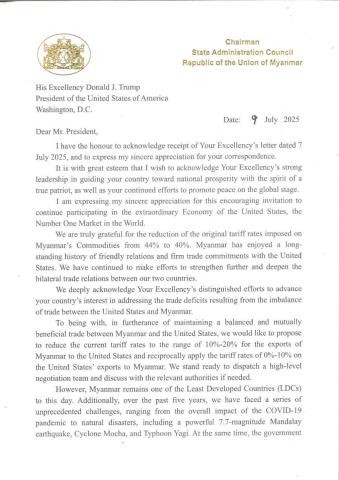
Nay Pyi Taw July 10
US President Donald Trump sent letters regarding the increased import tariffs to 14 countries namely Japan, South Korea, Malaysia, Kazakhstan, Tunisia, Bosnia and Herzegovina, South Africa, Indonesia, Bangladesh, Serbia, Cambodia, Thailand, and Laos, including Myanmar, on 7 July.
Nay Pyi Taw July 10
US President Donald Trump sent letters regarding the increased import tariffs to 14 countries namely Japan, South Korea, Malaysia, Kazakhstan, Tunisia, Bosnia and Herzegovina, South Africa, Indonesia, Bangladesh, Serbia, Cambodia, Thailand, and Laos, including Myanmar, on 7 July.
Regarding the letter, Chairman of the State Administration Council, Prime Minister of the Republic of the Union of Myanmar Senior General Min Aung Hlaing sent a response letter to US President Donald Trump on 9 July.
The response letter sent by the Senior General mentioned that he has the honour to acknowledge receipt of His Excellency President’s letter dated 7 July 2025. The Senior General acknowledged Mr President’s strong leadership in guiding his country toward national prosperity with the spirit of a true patriot, as well as continued efforts to promote peace on the global stage. The Senior General expressed his sincere appreciation for this encouraging invitation to continue participating in the extraordinary Economy of the United States, the Number One Market in the World.
The Senior General continued that he was truly grateful for the reduction of the original tariff rates imposed ton Myanmar’s Commodities from 44 percent to 40 percent. Myanmar has enjoyed a long-standing history of friendly relations and firm trade commitments with the United States. Myanmar has continued to make efforts to strengthen further and deepen the bilateral trade relations between the two countries.
The letter mentioned that the Senior General deeply acknowledged His Excellency President’s distinguished efforts to advance his country’s interest in addressing the trade deficits resulting from the imbalance of trade between the United States and Myanmar.
The Senior General added that to being with, in furtherance of maintaining a balanced and mutually beneficial trade between Myanmar and the United States, he would like to propose to reduce the current tariff rates to the range from 10 percent to 20 percent for the exports of Myanmar to the United States and reciprocally apply the tariff rates of 0 percent 10 percent on the United States’ exports to Myanmar. If needed, a high-level negotiation team will be dispatched as quickly as possible to the US to discuss with the relevant authorities.
The Senior General explained that Myanmar remains one of the Least Developed Countries (LDCs) to this day. Additionally, over the past five years, Myanmar has faced a series of unprecedented challenges, ranging from the overall impacts of the COVID-19 pandemic to natural disasters, including Cyclone Mocha, and Typhoon Yagi and a powerful 7.7-magnitude Mandalay earthquake. At the same time, the government and the people are navigating significant challenges.
The Senior General continued that he would like to take this opportunity to share with Mr President the efforts made by his government and the people of Myanmar in response to the current situation in Myanmar. Similar to the challenges Mr President encountered during the 2020 election of the United States, Myanmar also experienced major electoral fraud and significant irregularities. Despite multiple attempts by some political parties and the Tatmadaw to address these concerns, the then-ruling party and the former Union Election Commission not only dismissed these requests but also failed to resolve the issues. The attempt to unlawfully seize State power based on results arising from electoral fraud reflects a lack of justice. Amid growing confidence in the efforts of the political parties to demonstrate that the electoral outcome was compromised by the electoral malpractices, the Tatmadaw temporarily assumed the State's responsibilities under the Constitution. Subsequently, fabricated narratives circulated by certain news agencies then distorted the situation, shaping and leaving a negative image and perception of Myanmar's ongoing political developments within the international community.
The letter stated that following the Tatmadaw’s assumption of the State's responsibilities, a new Union Election Commission was reconstituted. The investigation uncovered 11.3 million cases of voting fraud, accounting for 29.54 percent of the total votes nation-wide. Based on the testimonies from individuals involved in the electoral malpractices, the UEC Chairman and members had been subsequently found guilty, appropriate legal actions were taken. They acknowledged the courts' decisions and complied with resulting punishments. Having completed their sentences, they have now been released. In addition, reconstitution of the UEC and the investigation into electoral fraudulence were also accepted as just and fair by legally registered political parties and the public.
The Senior General added that he sincerely appreciated Mr President's efforts aimed at promoting global peace, in regulating broadcasting agencies and funds, which have sometimes exacerbated the existing conflicts. Assessments influenced by one-sided misinformation and distorted narratives ultimately led to the imposition of the economic sanctions on Myanmar. So, he hereby respectfully requested Mr President to reconsider easing and lifting the economic sanctions imposed on Myanmar, as they hindered the shared interests and prosperity of both countries and the peoples.
The response letter mentioned that Myanmar has consistently upheld the tradition of peaceful coexistence with other nations and remains committed to maintaining good relations with all countries. Similarly, Myanmar has no dispute with any other countries including the United States.
The letter also said that Myanmar and the United States can enhance the existing bilateral trade relations by balancing tariffs and removing barriers, as Mr President proposed. With best regards, he wished Mr President and the people of the United States good health, prosperity and every success in future endeavours.
MWD Web Portal
Nay Pyi Taw July 10
US President Donald Trump sent letters regarding the increased import tariffs to 14 countries namely Japan, South Korea, Malaysia, Kazakhstan, Tunisia, Bosnia and Herzegovina, South Africa, Indonesia, Bangladesh, Serbia, Cambodia, Thailand, and Laos, including Myanmar, on 7 July.
Regarding the letter, Chairman of the State Administration Council, Prime Minister of the Republic of the Union of Myanmar Senior General Min Aung Hlaing sent a response letter to US President Donald Trump on 9 July.
The response letter sent by the Senior General mentioned that he has the honour to acknowledge receipt of His Excellency President’s letter dated 7 July 2025. The Senior General acknowledged Mr President’s strong leadership in guiding his country toward national prosperity with the spirit of a true patriot, as well as continued efforts to promote peace on the global stage. The Senior General expressed his sincere appreciation for this encouraging invitation to continue participating in the extraordinary Economy of the United States, the Number One Market in the World.
The Senior General continued that he was truly grateful for the reduction of the original tariff rates imposed ton Myanmar’s Commodities from 44 percent to 40 percent. Myanmar has enjoyed a long-standing history of friendly relations and firm trade commitments with the United States. Myanmar has continued to make efforts to strengthen further and deepen the bilateral trade relations between the two countries.
The letter mentioned that the Senior General deeply acknowledged His Excellency President’s distinguished efforts to advance his country’s interest in addressing the trade deficits resulting from the imbalance of trade between the United States and Myanmar.
The Senior General added that to being with, in furtherance of maintaining a balanced and mutually beneficial trade between Myanmar and the United States, he would like to propose to reduce the current tariff rates to the range from 10 percent to 20 percent for the exports of Myanmar to the United States and reciprocally apply the tariff rates of 0 percent 10 percent on the United States’ exports to Myanmar. If needed, a high-level negotiation team will be dispatched as quickly as possible to the US to discuss with the relevant authorities.
The Senior General explained that Myanmar remains one of the Least Developed Countries (LDCs) to this day. Additionally, over the past five years, Myanmar has faced a series of unprecedented challenges, ranging from the overall impacts of the COVID-19 pandemic to natural disasters, including Cyclone Mocha, and Typhoon Yagi and a powerful 7.7-magnitude Mandalay earthquake. At the same time, the government and the people are navigating significant challenges.
The Senior General continued that he would like to take this opportunity to share with Mr President the efforts made by his government and the people of Myanmar in response to the current situation in Myanmar. Similar to the challenges Mr President encountered during the 2020 election of the United States, Myanmar also experienced major electoral fraud and significant irregularities. Despite multiple attempts by some political parties and the Tatmadaw to address these concerns, the then-ruling party and the former Union Election Commission not only dismissed these requests but also failed to resolve the issues. The attempt to unlawfully seize State power based on results arising from electoral fraud reflects a lack of justice. Amid growing confidence in the efforts of the political parties to demonstrate that the electoral outcome was compromised by the electoral malpractices, the Tatmadaw temporarily assumed the State's responsibilities under the Constitution. Subsequently, fabricated narratives circulated by certain news agencies then distorted the situation, shaping and leaving a negative image and perception of Myanmar's ongoing political developments within the international community.
The letter stated that following the Tatmadaw’s assumption of the State's responsibilities, a new Union Election Commission was reconstituted. The investigation uncovered 11.3 million cases of voting fraud, accounting for 29.54 percent of the total votes nation-wide. Based on the testimonies from individuals involved in the electoral malpractices, the UEC Chairman and members had been subsequently found guilty, appropriate legal actions were taken. They acknowledged the courts' decisions and complied with resulting punishments. Having completed their sentences, they have now been released. In addition, reconstitution of the UEC and the investigation into electoral fraudulence were also accepted as just and fair by legally registered political parties and the public.
The Senior General added that he sincerely appreciated Mr President's efforts aimed at promoting global peace, in regulating broadcasting agencies and funds, which have sometimes exacerbated the existing conflicts. Assessments influenced by one-sided misinformation and distorted narratives ultimately led to the imposition of the economic sanctions on Myanmar. So, he hereby respectfully requested Mr President to reconsider easing and lifting the economic sanctions imposed on Myanmar, as they hindered the shared interests and prosperity of both countries and the peoples.
The response letter mentioned that Myanmar has consistently upheld the tradition of peaceful coexistence with other nations and remains committed to maintaining good relations with all countries. Similarly, Myanmar has no dispute with any other countries including the United States.
The letter also said that Myanmar and the United States can enhance the existing bilateral trade relations by balancing tariffs and removing barriers, as Mr President proposed. With best regards, he wished Mr President and the people of the United States good health, prosperity and every success in future endeavours.
MWD Web Portal
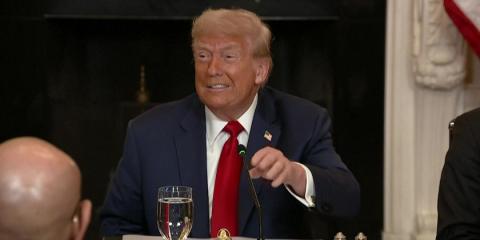
US President Donald Trump hailed West Africa's rich natural resources as he hosted five of its leaders Wednesday. The United States is working tirelessly to forge new economic opportunities involving both the United States and many African nations," Trump said. Trump's administration is seeking to strengthen economic ties with the mineral-rich region as it simultaneously curbs foreign aid to Africa and hits nations with 10 percent import tariffs.
US President Donald Trump hailed West Africa's rich natural resources as he hosted five of its leaders Wednesday. The United States is working tirelessly to forge new economic opportunities involving both the United States and many African nations," Trump said. Trump's administration is seeking to strengthen economic ties with the mineral-rich region as it simultaneously curbs foreign aid to Africa and hits nations with 10 percent import tariffs.
Talks with the presidents of Senegal, Liberia, Guinea-Bissau, Mauritania and Gabon were expected to focus on commercial opportunities and security. All five of the countries invited enjoy rich natural resources, including manganese.
mitv
US President Donald Trump hailed West Africa's rich natural resources as he hosted five of its leaders Wednesday. The United States is working tirelessly to forge new economic opportunities involving both the United States and many African nations," Trump said. Trump's administration is seeking to strengthen economic ties with the mineral-rich region as it simultaneously curbs foreign aid to Africa and hits nations with 10 percent import tariffs.
Talks with the presidents of Senegal, Liberia, Guinea-Bissau, Mauritania and Gabon were expected to focus on commercial opportunities and security. All five of the countries invited enjoy rich natural resources, including manganese.
mitv
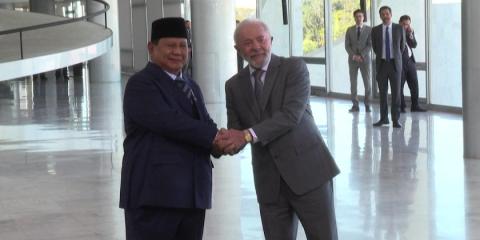
Brazilian President Luiz Inacio Lula da Silva welcomed Indonesian President Prabowo Subianto to the Planalto Palace during his state visit to Brasilia and held a bilateral meeting where they talked about diversifying commercial exchanges, including in the areas of civil aviation and defense products as well as the rapprochement between the Southern Cone and Southeast Asia which would be beneficial for global trade.
mitv
Brazilian President Luiz Inacio Lula da Silva welcomed Indonesian President Prabowo Subianto to the Planalto Palace during his state visit to Brasilia and held a bilateral meeting where they talked about diversifying commercial exchanges, including in the areas of civil aviation and defense products as well as the rapprochement between the Southern Cone and Southeast Asia which would be beneficial for global trade.
mitv
Brazilian President Luiz Inacio Lula da Silva welcomed Indonesian President Prabowo Subianto to the Planalto Palace during his state visit to Brasilia and held a bilateral meeting where they talked about diversifying commercial exchanges, including in the areas of civil aviation and defense products as well as the rapprochement between the Southern Cone and Southeast Asia which would be beneficial for global trade.
mitv

